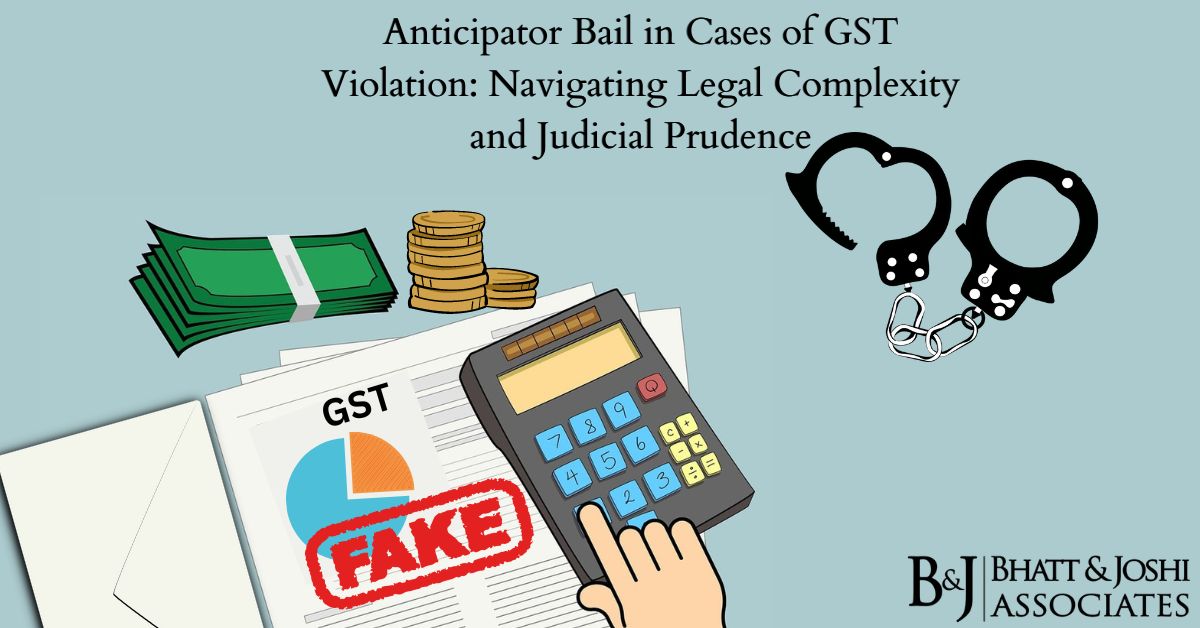Anticipatory Bail in GST Violations: Understanding Legal Complexity and Judicial Prudence
Introduction
The implementation of the Goods and Services Tax (GST) in India has brought about a substantial change in the country’s taxation system. Although GST has simplified the tax system, it has also led to legal complications, since people and corporations are being accused of GST infractions. Given these conditions, the act of pursuing anticipatory bail has emerged as a crucial legal remedy for those who are accused of breaching GST regulations. Anticipatory bail in GST violations is a legal remedy that enables individuals to evade arrest and confinement while investigations are ongoing. This article explores the notion of anticipatory bail in relation to offences involving violations of GST laws, analysing the legal consequences and the method used by the judiciary.
The Goods and Services Tax (GST) framework in India
The Goods and Services Tax (GST), implemented on July 1, 2017, combines many indirect taxes into a unified and all-encompassing tax system. Enforced by legislations such as the Central Goods and Services Tax (CGST) Act, 2017, State Goods and Services Tax (SGST) Act, 2017, and Integrated Goods and Services Tax (IGST) Act, 2017, the Goods and Services Tax (GST) functions on a tax system that is based on the location where the goods or services are consumed, collecting taxes at that specific point. The tax rates are classified into 5%, 12%, 18%, and 28%, with specific goods and services either exempted or subject to reduced taxation.
Instances of GST violations and their corresponding legal repercussions
The implementation of the Goods and Services Tax (GST) in India has not only simplified the indirect tax structure but also introduced strict penalties and legal repercussions for any infractions. The legal framework pertaining to infractions of GST is principally delineated in the Central Goods and Services Tax (CGST) Act, 2017, and other associated statutes. Offences within the scope of GST include various activities such as supplying goods or services without proper invoicing, issuing fraudulent invoices, obtaining input tax credit through fraudulent methods, failing to register under GST despite being obligated to do so, impeding GST officers in the performance of their duties, and intentionally evading GST by concealing information or falsifying accounts.
Section 69 of the CGST Act grants the GST authorities the authority to apprehend individuals if there are valid reasons to think that they have committed a serious offence under GST legislation, which carries a punishment of more than three years of imprisonment. Nevertheless, it is imperative to highlight that prior to making an arrest, the GST authorities are obligated to adhere to the proper legal procedures, affording the accused an opportunity to present their case. If authorities have reason to believe that an individual may flee or manipulate evidence, they can make an arrest without a warrant. The CGST Act delineates the penalties for certain offences in Section 122, while Section 132 specifies more stringent repercussions. The purpose of these penalties and sanctions is to discourage future wrongdoers and guarantee adherence to GST regulations. It is crucial to acknowledge that infractions of GST are considered as grave economic offences with substantial consequences for the government’s revenue.
Anticipatory bail in GST violation Cases
When people and corporations are about to be arrested for GST infractions, they can seek anticipatory release under Section 438 of the Code of Criminal Procedure (CrPC). This legal recourse enables an individual who is accused of a crime to request bail prior to the submission of a First Information Report (FIR), so preventing arrest and confinement. The importance of anticipatory bail is especially evident in circumstances pertaining to GST infractions, where severe penalties and legal repercussions are imminent.
Protocol for Obtaining Anticipatory Bail in GST Violations
In order to obtain anticipatory bail, an individual must submit an application to the relevant court. The court, in turn, assesses the characteristics of the offence, the available evidence against the accused, the probability of evidence tampering, and the level of cooperation exhibited by the accused during the inquiry. Section 438 of the Code of Criminal Procedure (CrPC) offers a safeguard against unjustified apprehension, acting as a crucial protection for individuals who are concerned about being arrested based on unfounded or trivial accusations, or as a result of personal or political grudges.
 Whatsapp
Whatsapp


